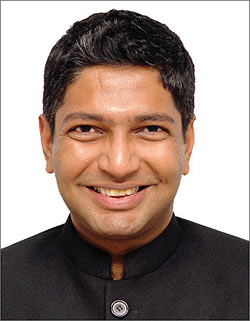
Most of us associate social networking sites like Facebook and Twitter with teenagers throwing sheep at friends or celebs keeping the world up-to-date about their designer purchases. However, there is another side to social media, one that offers substantial earning potential with barely any investment.
Social media marketing is opening up a whole new avenue for young professionals looking to grow beyong the traditional marketing avenues of television and print. So what exactly is social media marketing and how does it work? To find out more, we spoke to Gaurav Mishra, founder and CEO of 2020 Social, a social business strategy firm that uses social media sites like Facebook and Twitter to help companies grow their brands.
Tell us a bit about yourself and how 2020 came about.
I studied at IIM Bangalore and then worked at the Tata Group, as part of Tata Administrative Services programme. I was last the head of sales and marketing for the Tata Indica. I left because I had a quarter-life crisis (laughs). I felt like all I knew was how to spend crores of advertising budget every year to interrupt people with TV ads. But I myself was impossible to interrupt. I don't watch TV, don't read newspapers, don't listen to the radio. On my mobile phone I have DND (do not disturb). I work only on the Internet. So I began to wonder, how do you market to people like me? An online community seemed like a good way to do that.
In marketing first you need to know what people are passionate about and then what are your [a product's] brand values and then see how you can connect the two.
So that is how I started getting interested in social media marketing and online communities. Back then I was already writing a fairly popular blog, and a lot of journalists were speaking to me about stories on how Indian brands were using digital marketing. So in 2007-08 I left my job and went off consumption for a year. I stopped buying stuff, came away with everything I had and moved to Washington DC on a Yahoo fellowship to teach at Georgetown University.
While I taught, I also led a team of two postgraduate students and did research on the impact of the Internet on society in emerging tech countries (India, Russia, China). I did that for a year and then returned to India and started 2020.
What exactly does 2020 Social do?
Simply put, we build online communities. We work with brands and help them address the fact that it doesn't work to have a television commercial and try to promote it on social networks. The company instead needs to start their online community by trying to connect their brand values with their evanagelists and users.
An example of such a community is dellgogreen.com which was an ideation platform that we created for Dell where users submitted ideas on how to redesign, reuse, recycle gadgets so that they could be more green. So, we would build a community like that and connect it to Facebook, YouTube, Twitter and try and get people on to this community from all the existing social networks.
Typically there will be a 'plan' phase where we do the strategy for the brand. Then there will be a 'build' phase where we build what we suggested. And then there would be an ongoing 'engage' retainer where we would create content, do community management. That is the typical work we do.

How does a project typically begin?
Usually it begins with the chief marketing officer (CMO) or the equivalent of the CMO, from whom we get a mandate. We then we work with the brand team on the planning and implementation.
2020 began in 2009, how easy or difficult has it been given the fact that it is still a very new field?
It has been fairly interesting actually. The social media industry in India is structured in a way where people can do simple things like Facebook pages, Twitter accounts etc for about Rs 5,000 a month. And then there are people who charge Rs 5 lakh a month to do fairly meaningful, large projects. The brand managers or the client don't necessarily see a hundred fold difference between the two. So brand managers are still figuring out how a standalone online community is different from a Facebook communit y. For instance in a Facebook community you can't do much more than maybe a few posts on a wall, post a few photographs etc. But some of the things that we build have fairly high functionality.
So while it has been easier to get the mandate from the CMO, it has been difficult to execute that mandate at the brand manager level because they are often tied down to the usual TV commercial routine. And sometimes don't see value in doing large pieces or sometimes see value but don't have the know-how or the bandwidth to execute it to any great effect.
It has been difficult but we have been lucky, we work with almost a dozen large clients.
So how do you measure the returns through this activity?
You measure them the same way you would with any other marketing programme. In fact you can measure more.
How do you measure your returns on a TV ad or with direct advertising? You can't really. For an ad, they say this is how much we spent, this is how many people we think watched the TV ad and that is the only sort of measurement. It is the same with print.
In social media however, you can measure much beyond that, you can measure how many leads you got, how people joined your Facebook page or Twitter profile, how many people registered on your website, how many people mentioned you, whether positiveor negative. So you can measure various metrics.
If you have the will to measure things like that, it is possible. In my experience, most brands in India don't measure much.
When a client asks about their return on investment, you can say 10,000 people will visit or 20,000 will register on your Facebook account. Out of these 10,000 people 1,000 will say something meaningful about you. Either they will speak about you or upload a photo or share an idea or suggestion. Apart from this about 200,000 or 500,000 people will see or have the opportunity to see the interactions.
There are a lot of young people who are clued in to social networking sites today. Is this a job opportunity for them?
Speaking for myself, I would not hire somebody just because they know how to use Facebook. I would hire someone who knew design or marketing or because they would know business development or technology and they also know how to use these social networking sites effectively or they know how to write a blog post, for instance.
So to be 'meaningfully' employed in this space you need to have other skills that can help you connect effectively. Facebook and Twitter is like e-mail, you would not hire somebody just to read and reply to e-mail, you would hire a secretary to do that. That is the difference between firms that charge Rs 5,000 a month -- they are basically hiring 'secretaries'.
However, when companies hire agenicies to do e-mail marketing, if you know how to work with a large database and how to measure the conversion rate of your e-mail then you can create a significant business around that. So there is some value in knowing how to work well with these tools, like knowing how to develop a Facebook application. You do need to have an understanding of the dynamics of the space.
For instance I have a marketing background. Other people in my team have worked in a product management role, others have been in advertising for many years, have written books on social media marketing. It is useful to have another skill set where then the social media acts as a multiplier.

What are the profiles you look for in potential hires?
In my team I had someone who studied at Stanford University, someone who worked at CapGemini and worked in enterprise solutions, another who studied at XLRI with experience in operational developement, people from IIT Delhi, Kanpur.
But the model other agencies have, which perhaps is a better model, is hiring people fresh from college who know how to use Facebook, Twitter, can write relatively well. Sometimes they would hire client servicing people, PR professionals, copywriters.
What is the earning potential for newcomer or fresher?
If freshers work in an agency, they can make about Rs 10,000, about the same in a PR agency or a little less. This is why a lot of freshers who want to get into social media start up their own agencies, because the barriers to entry are so low, anybody can have a few thousand followers on Twitter. So for a fresher starting up a social media agency, they can earn about Rs 50,000 to 1 lakh a month with a small team of 3-4 people.
What is the kind of investment involved?
For a fresher who has just graduated from college or perhaps is still in college, there is no real investment required. They are staying with their parents, working from home, the team can meet up in coffee shops and meet cleints at their offices, so there is zero investment required. The only real investment is in broadband connections, data cards and laptops which they would probably already have. At one level there is no investment required for a basic social media agency. On the other hand, you could invest about a crore for a full team to create different products with different capapbilities. So there is a wide spectrum.
What do you see as the potential in this field?
I see a lot of potential. A lot of agencies (advertising, PR or just specialised social media agencies) are already offering a lot of social media offerings. Even market research agencies like Neilsen, etc have social media monitoring tools.
Many of the software development companies are building strong social media development pratcices where they are building communities or social media websites etc. So I do see companies like 2020 Social becoming large players with 50-100 people, with Rs 15 crore revenues. There should be about 3-4 agencies like this earning purely from social media. We will also see other types of agencies making money from it. I feel that even if you take the advertising part out of it, I see it as a Rs 500 crore business in about 5 yeras.
What is your advice to young people looking to enter the field?
Don't just do Facebook pages and Twitter profiles because no one will pay you anything meaningful. Find a way to differentiate yourself. Focus on an industry, I know people who focus on the media and entertainment industry or people who build products. So differentiate yourself and get in it for the long term.
And your advice for young Internet entrepreneurs?
There are so many opportunities in India, it is endless. In India the Internet space is growing fast. Some people believe that in 2-3 years there from today's approx 30 million there will be 250 million people on the Internet (between Internet and 3G), so the opportunity is huge.
India is also a very well connected country when it comes to being connected to the rest of the world. So there are strong opportunities for entrepreneurs in India to build Internet enterprises that are made in India but made for the world.
I see more Indian entreprenurs saying they have enough understanding of the European or American markets to build products for the global market and not just for India. And I see more and more of them succeeding.